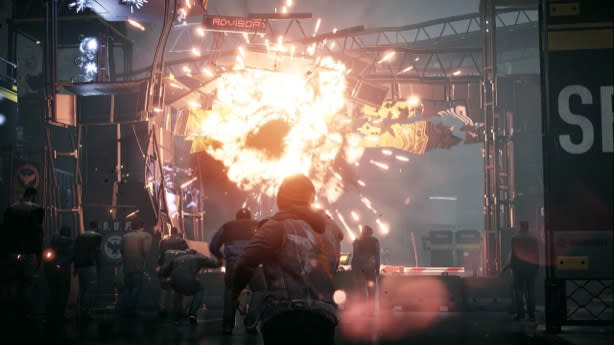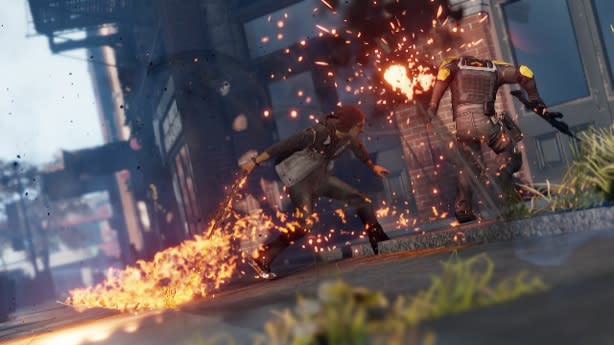The Guilty Pleasures of Infamous: Second Son

Searching for the subtleties in a superhero game is like straining your ears to find the bright ting of a triangle buried somewhere in a bombastic marching band. It adds a pleasant touch of finesse, even if you're just there to feel the drums pushing you back.
Infamous: Second Son has its own little triangle in the unfettered actions of Delsin Rowe, a one-man superband imbued with corrosive powers of smoke, ember and neon. He's essentially a weaponized e-cigarette, lobbing vaporous projectiles and rocketing through Seattle's rooftop vents like a wispy snake. It's almost exactly as fun as it sounds, thanks to rapid movement tuned to the environment's ups and downs. That relentless pursuit of locomotion and non-stop enjoyment, however, may be the one thing that prevents Infamous from growing into something more.
Putting flash and excitement first is a perfectly valid decision from the developers at Sucker Punch, and most reviews will argue that it's a great one. It's not entirely compatible with the game's tests of morality, though, and I'm not convinced it ever will be.

Infamous: Second Son often asks you to direct your newfound super-ness towards either good or evil purposes, but the disparity is so cartoonish you never consider the variables posed by the story itself. Delsin's first dilemma, for instance, amounts to "Will you let an old lady be tortured, Y/N?" If there's any question about the necessity or abuse of power – or an attempt to role-play as someone considering the fallout of their choices – it's drowned out by the game yelling STOP, DECISION TIME. ARE YOU A PSYCHOPATH Y/N?
Beyond that you're determining which set of powers you'd like, which is an independent choice that exists because of the game's economy of good and evil points, not its plot. There are clear attempts to highlight the classic superhero dilemma, of weighing the benefits of unlimited power and wise restraint, but they fail in the orchestrated moments – yet succeed in the smaller, player-directed ones.
It happens on the street, mechanically, in the midst of your constant fights against the military faction trying to flush people like Delsin out of Seattle. You expect the neighborhood to be thoroughly thrashed by the end of a battle, but offing an innocent bystander can happen by accident – and as you grow more powerful, you don't just kill people by mistake, you straight-up vaporize them.

Given the disposable nature of video game strangers, their accidental death isn't likely to eat away at you in your sleep. There is a thought-provoking transaction to them, however, when it comes to triggering Delsin's ultimate attack.
You must defeat a string of opponents in quick succession to empower it, and keep a "rampage" reward alive long enough. It'll flash and flash, faster and faster, as it counts down, begging for one more kill before it expires. You scan the area – I need someone to take out, I need someone right now, you think. More flashing. C'mon, there has to be someone. You spot a cowering posture slinking through some overturned cars and BOOM - an incinerated civilian keeps the counter alive. You've made a real choice: In order to crush this military faction and liberate other segregated super-people like yourself, to keep your fight going, you've cashed in one of Seattle's innocents. Was it worth it?
This cost of power isn't explored much further, because the game has an overriding desire to stay fun. You can't really blame it – that's why people love Infamous – but it's an odd case of equality making everything weaker. Whether you're "good" or "evil," your powers are a blast, and the consequences, such as they are, remain confined within story scenes.
Is it even worth envisioning an Infamous game where it's literally less fun being a Boy Scout than being a scoundrel? I think there's already a belief that evil is more exciting by default, but the basic lexicon of Second Son isn't really affected by your moral intent. The cadence of attack and retreat is identical, the spectrum locked between regular and "stylish" kills. Though the outcomes of good and evil are different as measured by Infamous, there's no difference in the emotional feedback given to the player. This is not a resentment of enjoyment, I should add, but recognizing that the pursuit of it crushes morality.
A different approach for Infamous would be to whiff the good path - make evil appealing not only visually, but mechanically. If while playing as a good hero, deliberately, slowly and carefully, the evil path would be a temptation. If you grew irritated by the pacing and the ungrateful populace, think how you'd arc your finger above that trigger. Wreaking havoc is fun because it's a counterpoint to the well-meaning and the patient. Leaving Seattle intact, knowing you mastered restraint, would be rewarding in a different way.

Alternatively, why not be more ambiguous? Remove the good/evil economy from the equation entirely, and play as a person, rather than a dot traversing a skill tree. Open all the powers, and have the fiction conspire against you, and instill a sense of guilt whenever you accidentally reduce a city block to smithereens.
lnfamous: Second Son does occasionally spend its money like that. When Delsin makes an inconsiderate call, he receives nuclear-level scolding from Betty, a wonderfully expressive parental figure that spurs his visit to Seattle. She puts those fantastic graphics, performance-captured cutscenes and next-gen wrinkle-tech to perfect use: conveying a dreadful, motherly level of disappointment in you. It's just the worst.
But then it's back to the playground of Seattle, far from Betty's eroding gaze. Maybe that's the problem with superhero games – they give you all of the power and none of the guilt. Is that a good or a bad thing?
[Images: SCEA]
